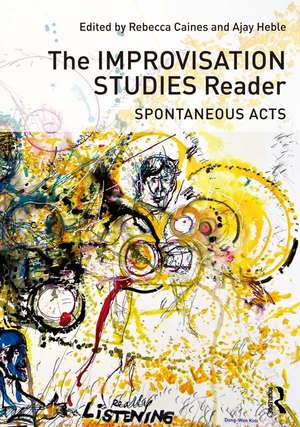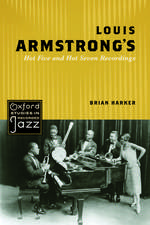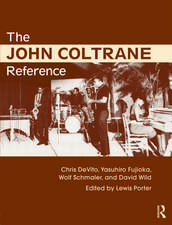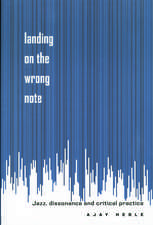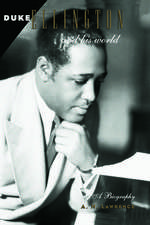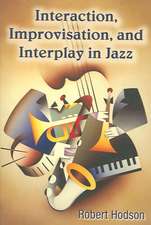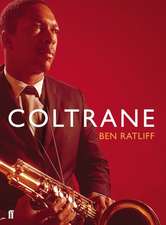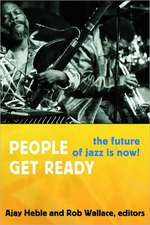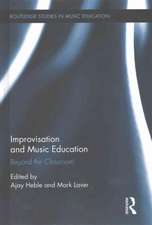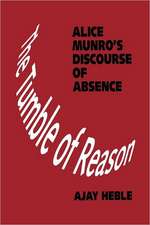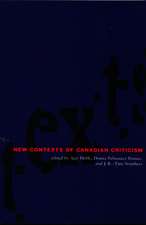The Improvisation Studies Reader: Spontaneous Acts
Editat de Rebecca Caines, Ajay Hebleen Limba Engleză Paperback – 27 feb 2015
The Improvisation Studies Reader draws together the works of key artists and thinkers from a range of disciplines, including theatre, music, literature, film, and dance. Divided by keywords into eight sections, this book bridges the gaps between these fields. The book includes case studies, exercises, graphic scores and poems in order to produce a teaching and research resource that identifies central themes in improvisation studies. The sections include:
- Listening
- Trust/Risk
- Flow
- Dissonance
- Responsibility
- Liveness
- Surprise
- Hope
By placing key theoretical and classic texts in conversation with cutting-edge research and artists’ statements, this book answers the urgent questions facing improvising artists and theorists in the mediatized Twenty-First Century.
| Toate formatele și edițiile | Preț | Express |
|---|---|---|
| Paperback (1) | 502.49 lei 6-8 săpt. | |
| Taylor & Francis – 27 feb 2015 | 502.49 lei 6-8 săpt. | |
| Hardback (1) | 1236.25 lei 6-8 săpt. | |
| Taylor & Francis – 30 iul 2014 | 1236.25 lei 6-8 săpt. |
Preț: 502.49 lei
Nou
Puncte Express: 754
Preț estimativ în valută:
96.18€ • 104.51$ • 80.84£
96.18€ • 104.51$ • 80.84£
Carte tipărită la comandă
Livrare economică 21 aprilie-05 mai
Preluare comenzi: 021 569.72.76
Specificații
ISBN-13: 9780415638722
ISBN-10: 0415638720
Pagini: 478
Ilustrații: 20 black & white halftones
Dimensiuni: 174 x 246 x 30 mm
Greutate: 0.77 kg
Ediția:New.
Editura: Taylor & Francis
Colecția Routledge
Locul publicării:Oxford, United Kingdom
ISBN-10: 0415638720
Pagini: 478
Ilustrații: 20 black & white halftones
Dimensiuni: 174 x 246 x 30 mm
Greutate: 0.77 kg
Ediția:New.
Editura: Taylor & Francis
Colecția Routledge
Locul publicării:Oxford, United Kingdom
Cuprins
Introduction Part 1: Listening 1. Improvised Listening: Opening statements – George Lipsitz 2. On Listening - Jean Luc Nancy 3. Improvisation: Silence before words – Jacques Lecoq 4. Going Fragile – Mattin 5. Music, Language, and Cultural Styles: Improvisation as conversation – Ingrid Monson 6. Interview - Peter Cusack 7. Deep Listening Meditations – Egypt (1999) – Pauline Oliveros Part 2: Trust/Risk 8. Improvised Trust: Opening Statements – Ellen Waterman 9. Improvisation – Konstantin Stanislavski 10. Impro – Keith Johnstone 11. Thoughts on Improvisation: A comparative approach – Bruno Nettl 12. Group Creativity: Musical Performance and Collaboration – Keith Sawyer 13. The Theatre as Language: Theatre of the Oppressed – Augusto Boal 14. Community Arts Practices: Improvising being together – Petra Kuppers 15. "Paradise Now": Notes – Judith Malina and Julian Beck 16. Chicanas’ Experience in Collective Theatre: Ideology and form – Yvonee Yarbro-Bejarano 17. Spontaneous Combustion: Notes on dance improvisation from the sixties to the nineties – Sally Banes 18. Collective Creation – Alan Filewood 19. Cobra – John Zorn Part 3. Flow 20. Improvised Flow: Opening Statements – Susan Leigh Foster 21. A Theoretical Model for Enjoyment – Mihaly Csikszentmihalyi 22. Graphic Score – Anthony Braxton 23. The Impermanent Art – Merce Cunningham 24. Improvisation and the Ensemble – Michael Chekhov 25. Theory of the Derive – Guy Debord 26. Flow, Layering, Rupture in Hip-Hop – Tricia Rose 27. Improvisation and the Making of American Literary Modernism – Rob Wallace 28. Graphic Score (Hearing Visions Sonores) – Germaine Lio and Nicholas Loess 29. Essentials of Spontaneous Prose – Jack Kerouac Part 4. Dissonance 30. Improvised Dissonance: Opening Statements – Jesse Stewart 31. Phantoms of the Other: Fragments of the Communal Unconscious – Rustom Bharucha 32. Bebop as Cultural Alternative – Daniel Belgrad 33. Happenings: An introduction – Michael Kirby 34. Other: From noun to verb – Nathaniel Mackey 35. Play Like a Girl: The queer laughter of the feminist improvising group – Julie Dawn Smith 36. Causing a Scene with ImprovEverywhere – Charlie Todd 37. Improvising Digital Culture – Paul D. Milelr (DJ Spooky) and Vijay Iyer Part 5. Responsibility 38. Improvised Reponsibility: Opening statements – Daniel Fischlin 39. Gittin To Know Y’all: Improvised music, interculturalism, and the racial imagination – George E. Lewis 40. Interview – Fred Frith 41. Kinship, Intelligence and Memory as Improvisation: Culture and performance in New Orleans – Joseph Roach 42: The Changing Same: R&B and new black music – Amiri Baraka 43: By Any Means Necessary – Malcolm X Part 6: Liveness 44. Improvised Liveness: Opening statements 45. Liveness – Philip Auslander 46. The Revolution Will Not Be Televised – Gil Scott-Heron 47. The Present of Performance – Hans-Thies Lehman 48. Interview – Pierre Hebert Part 7. Surprise 49. Improvising Surprise: Opening statements – Rachel Rosenthal 50. Playing – Richard Schechner 51. Taken by Surprise – Susan Foster 52. Seven Aspects of Spontaneity – Viola Spolin 53. Yoruba Play and the Transformation of Ritual – Margaret Thompson Drewal 54. Play On: Collaboration and Process – Tim Etchells 55. Step Across the Border – Nicholas Humbert and Werner Penzel Part 8. Hope 56. Improvised Hope: Concluding statements – Robin Kelley
Recenzii
"It engenders similarly articulated and diverse understandings of how improvisation suffuses many aspects of our lives and, more importantly, how interpersonal collaboration appreciative of and empathetic toward those differences can affect and enact positive social action."
- Mark Lomano, Jazz and Culture
- Mark Lomano, Jazz and Culture
Descriere
Improvisation is a performance practice that animates and activates diverse energies of inspiration, critique, and invention. In recent years it has coalesced into an exciting and innovative new field of interdisciplinary scholarly inquiry, becoming a cornerstone of both practical and theoretical approaches to performance.
The Improvisation Studies Reader draws together the works of key artists and thinkers from a range of disciplines, including theatre, music, literature, film, and dance. Divided by keywords into eight sections, this book bridges the gaps between these fields. The book includes case studies, exercises, graphic scores and poems in order to produce a teaching and research resource that identifies central themes in improvisation studies.
The Improvisation Studies Reader draws together the works of key artists and thinkers from a range of disciplines, including theatre, music, literature, film, and dance. Divided by keywords into eight sections, this book bridges the gaps between these fields. The book includes case studies, exercises, graphic scores and poems in order to produce a teaching and research resource that identifies central themes in improvisation studies.
